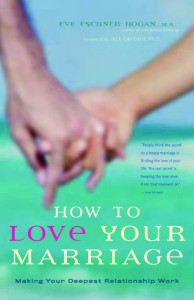Married? Know someone getting married? Start their relationship off right! Here is how to apply Eve’s relationship tools to Marriage!
How to Love Your Marriage: Making Your Closest Relationship Work
Hunter House Publisher $16.95
Keeping the love in your marriage requires skills that most of us have not
been taught in school or at home. Many people think that the secret to marriage is finding the love of your life. Of greater importance is keeping the love in your life once you’ve found it.
Relationship expert Eve Eschner Hogan, M.A., first brought her wisdom to single readers contemplating involvement with Intellectual Foreplay: Questions for Lovers and Lovers-to-Be. She followed that up with a book to help readers navigate the crazy world of online dating, Virtual Foreplay: Making Your Online Relationship a Real-Life Success. Now Eve’s turned her focus to readers who have found love and want to keep it with How to Love Your Marriage: Making Your Closest Relationship Work.
How to Love Your Marriage starts from the premise that love, like self-esteem, doesn’t go away;
it just gets blocked by negative experiences, comments and beliefs that make the love difficult to feel.
When we learn how to remove those obstacles, to let go of the past, move beyond our egos and align
our actions with our goals, we can reawaken the love and keep our marriage growing.
How to Love Your Marriage provides:
• Methods for problem-solving and being your own best relationship advisor
• Empowering “How to” steps to take even if your partner is not willing to take them with you
• Simple “Love Tips” that you can use immediately
• Tools for managing your emotions — and those of your spouse
• The EROS formula for creating powerful, loving relationships
• Self-directed exercises and questions
• Understanding of self-esteem’s impact on a relationship and a relationship’s impact on self-esteem
Table of Contents:
Part I: It’s All About You
The Relationship Principles
The EROS Equation
The Guideposts
Understanding the Role of Self-Esteem
Assessing the Gaps
Steps for Turning it All Around
Part II: Working as Two
Embracing Change
Managing Emotions and Communicating Clearly
Part III: Playing Together
Love and Romance
The Physical Touch
Part IV: The Bigger Picture
Family Matters
Marriage as a Spiritual Journey
Ten Relationship Principles from How to Love Your Marriage:
Principle number one: Relationships are a process, not a product
Life is a great big classroom and relationships are our teachers. We are here (in human form) to learn, love, laugh, and serve. Every experience we have is geared to present us with an opportunity to gain more compassion, practice acceptance, transcend our egos, maintain our sense of humor, and expand our wisdom. The goal of marriage is not just about achieving the end result, or “product,” of “forevermore,” but rather is about improving the “process” of how we are showing up, what we are learning, and how we are growing. It is about the quality, not the quantity. Although we certainly want our marriage to last, more importantly we want it to serve each partner’s personal and spiritual growth.
Principle number two: Every effort you make will benefit you
If you practice and master the skills presented here you may save your marriage and make it healthier, stronger, and more enjoyable. It is also possible that you or your spouse will decide to get out. You need to do the work either way. The benefit of gaining these essential life skills is that you will achieve greater self-mastery and will be healthier and happier-even if your relationship doesn’t continue. These skills will follow you into every situation and will serve you in every relationship throughout your life.
Principle number three: Your values act as guideposts for your decisions
Every problem can be solved by more than one solution. However, not all solutions will be in alignment with your authentic self. For example, if your goal is to have lots of money, you could take up robbing banks. However, for most people this is not an option because it is out of alignment with their values. To be in integrity with who you really are and what you really want to create, you will need to consciously make choices that are guided by your values. To allow your values to guide you, you will need to determine exactly what they are. In a relationship it is not necessary that your values be exactly the same as your partner’s, but it is important that your values be complementary and supportive of one another’s and that you respect each other’s priorities. If your goal is to love your marriage, identifying and operating within your values will guide you with integrity.
Principle number four: Ego is always what blocks love and joy
True love does not go away-ever. It just gets blocked from flowing (by ego). An active ego shows up in the need to control and in the need for approval. It materializes in relationships through nagging, sarcasm, judgment, disappointment, jealousy, possessiveness, hurt, and fear. When you dislike what you are experiencing in yourself, in your marriage, or in your life, that state of mind blocks the flow of love and joy. As you learn to transcend your ego, you can restore the flow of love in all of your relationships. Your job, if you want to restore a loving marriage, is to remove the obstacles that dam the flow of love between you and your partner.
Principle number five: You are the common denominator in all of your relationships
You are a primary ingredient in every relationship you’re in. How you handle things-what you say and what you do-enhances or destroys the quality of those relationships. If you lack a strong sense of your worth, you will find ways to sabotage your relationships. So if you want to have healthy, loving relationships with others, including your spouse, you need to start by building a healthy, loving relationship with yourself.
A big part of building a strong relationship with yourself is the discovery (or rediscovery) of your authentic self, what I refer to as your soul essence. Our souls are love; they are loving, lovable, and joyful. At the soul level we are creative, funny, honest, wise, intuitive, and spiritual. These are critical qualities for successful relationships. The more in touch you are with your soul essence, the healthier your relationships will be. The more you know yourself and love yourself, the more authentic you will be in your self-expression. The more authentically you show up, the more authentically someone can love you (because they will actually know who you are).
Principle number six: You can only change yourself, but doing so influences others
You cannot change your spouse (or your kids, boss, parents…). You can, however, change the way you relate to your spouse, which will in turn trigger a new response from him or her. Your spouse will change in relationship to how you treat him or her. Whenever you are faced with a difficult situation, instead of pondering how your partner needs to change, ask yourself what you can do differently to change the situation.
Principle number seven: You are responsible for your experience in your relationships
It is our natural inclination-especially in relationships-to blame the other person when we are not feeling loving, loved, or joyful. However, as I’ve mentioned, ego is always what blocks love, and transcending the ego to restore the flow of love and joy is our personal responsibility. In fact, it is not something our partners can do for us. We have to do the work ourselves. The work may come in the form of negotiation, communication, acceptance, or forgiveness, but the job is our own. Although you cannot directly change your partner, you can change your relationship by changing the way you show up in it.
Principle number eight: Self-observation is the key to change
By observing yourself (noticing what you are doing, thinking, saying, and feeling in any given moment), you will become aware. When you are aware, you are given the golden opportunity to determine whether or not you like what you are aware of, and whether it is serving you. If you do not like what you are thinking, doing, or feeling, your awareness allows you to make a new choice-one that is in alignment with your goals and values. Choice makes you powerful. When you are powerful, you can transform your relationships rather than being a victim of them.
Part of the self-observation process is self-inquiry. When you observe an emotion that is impacting you, taking yourself through a series of questions to better understand what is triggering the emotion will help lead you to the limiting or even false belief that is causing you pain. Self-observation and self-inquiry are essential skills for understanding yourself and relating more effectively with others.
Principle number nine: Change can (only) happen in a moment
When you want to change something-your fitness level, your organizational skills, the quality of your relationship-it is overwhelming and self-defeating to try to change the entirety of the situation at once. You cannot improve your fitness from this day forward, but you can, in any given moment, change how you care for your fitness in that moment. While you cannot change the entire quality of your marriage from this day forward, you can change how you care for and handle any given moment in your marriage. Each transformed moment connects to the next moment and the next. By simply paying attention to how you are handling each individual moment, you can change the quality of the whole relationship.
Principle number ten: Relationships are a spiritual journey
Regardless of your religion, or even if you don’t subscribe to any particular set of religious beliefs, the qualities generally called upon to live a spiritual life-honesty, compassion, forgiveness, service, devotion, dedication, intention, trust, unconditional love-are the very same qualities needed to have a healthy relationship. At the same time, relationships are the perfect place to develop these qualities. In fact, relationships are the only way that we can practice and master these qualities, because by their very nature they are applied and experienced with someone else-whether that be God, your spouse, your friends, your family, or strangers.
The larger point is that there is a greater purpose to gaining these skills than simply keeping your marriage together-which is, of course, a wonderful and worthy goal. Our “spiritual job” as humans is to master these skills for the ultimate relationship: our relationship with the Divine. Again, this requires surrender of the ego. Although this book is not a “spiritual” book per se, the skills required for loving your marriage are, indeed, spiritual skills.
To purchase an autographed copy, call 808-243-PATH (7284)


Recent Comments